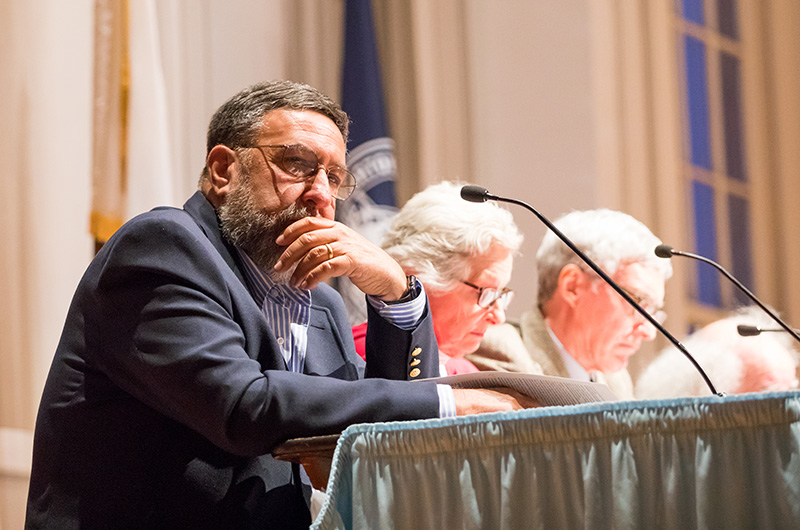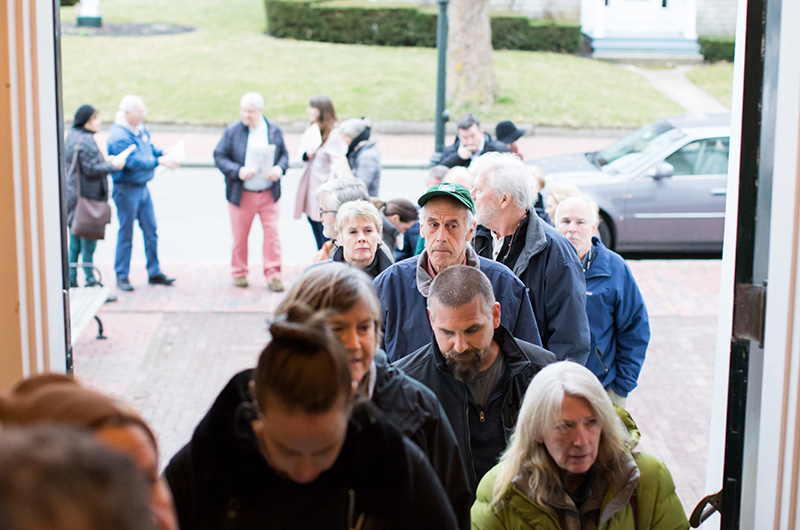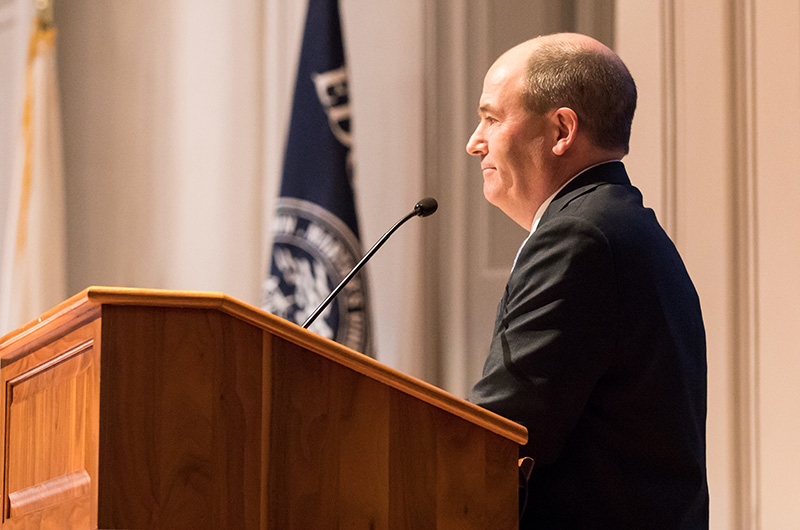In a long and often emotional evening, Edgartown voters powered through a 95-article town meeting Tuesday that saw the defeat of two housing bank measures, the approval of a new hangar at the Katama Airfield, and nearly $1 million in funding for renovations to the Morse street dock.
And while the meeting didn’t finish until well after the bell tower in the Old Whaling Church tolled the 11 p.m. chimes and the quorum had dwindled to a bare minimum, in nearly five hours a new moderator, town clerk and town administrator were able to usher through a $38.2 million budget and millions more in appropriations.
The night began with its usual pomp, as sixth-grader Kathleen DaSilva led the town’s 258 voters in the pledge of allegiance. Town poet laureate Steve Ewing honored former selectman Ted Morgan, who had died two days prior, with a few stanzas of tear-choked verse.
“Right up front, every year / the colonel’s in his full dress gear,” Mr. Ewing read. “And as we lay him down to rest / may his soul be forever blessed / and may our Ted forever sleep / in Island soil, full and sweet.”
Mr. Ewing said he included the last line because Ted Morgan used to say he didn’t want to be buried on Martha’s Vineyard he wanted to be buried in Edgartown. A moment of silence followed for Mr. Morgan.
The quietude didn’t last long. Fierce debate quickly flared over two early articles on the special town meeting warrant to enact and fund an Islandwide housing bank. The proposal would create a bank using funds from a newly enacted rental tax to support year-round housing.
Mr. Ewing spoke in favor of the bank, saying that in light of the Island’s long history, the housing bank had become a modern necessity.
“Back in the 1600s, the Mayhew’s probably paid folks to settle on Martha’s Vineyard. We’ve come a long way from those days,” he said. He explained that the housing bank would be funded by tax revenue from what he considered the source of the problem: short-term rentals. “If the towns can all join together and pool this new resource, as we have in the past, a few more of my kids and local workers may have a better chance to stay here and contribute.”
Others who spoke in favor of the bank included Dean Rosenthal and Victoria Haeselbarth. Both said it was crucial to immediately earmark a portion of the short-term rental tax for affordable housing, despite opposition from selectmen.
“When I learned our town leaders were skeptical of the housing bank, I concurred,” Ms. Haeselbarth said. “Logically they wanted to follow that full revenue stream before committing themselves. But the problem is, we don’t have time. The funds will be delivered elsewhere.”
After hearing from more proponents, skeptics rose to question town officials about the logistics of the proposed legislation. Paulo De Oliviera, who is the elected Register of Deeds and a member of the town finance committee, explained why the committee had voted to not recommend the warrant articles, saying it would be unwise for the town to commit to funding a measure without knowing the full extent of the short-term rental tax revenue stream.
“Overall, we just need a little more time to see what this rental tax number would represent,” Mr. De Oliviera said. “It’s not about the goal [to create more housing opportunities], it’s about the mechanism that was presented to us,” he said.
Town counsel Ron Rappaport spoke at length, outlining numerous legal concerns with the bill and the way it is worded, including a lack of definition of year-round housing, confusing language and internal inconsistencies.
“I am not going to address the housing bank as a concept,” Mr. Rappaport said. “But as a piece of legislation, it is flawed.”
Selectman Michael Donaroma moved to indefinitely postpone the first article (enacting the housing bank) with a condition that housing bank proponents and town officials work together and hold public hearings before the next annual town meeting.
“After listening to everything that’s been said here tonight, and looking at this petition, I think it is pretty clear that the housing bank has gotten out ahead of itself,” Mr. Donaroma said. “I think the biggest mistake would be to rush through this.”
Although the discussion continued for another hour, Mr. Donaroma’s motion ultimately passed 208-64. A second article concerning a funding mechanism for the housing bank was quickly defeated on a voice vote.
Moderator Sean Murphy then pushed the meeting forward at it characteristic rapid-fire pace, rattling off unanimous votes in favor of spending measures that ranged from dehumidifying the Edgartown School to new public safety vehicles.
Voters unanimously approved a $38.2 million operating budget with little discussion, and also green-lighted nearly $800,000 in community preservation funds for new tennis and pickleball courts at the town’s Robinson Road facility.
The meeting hit a snag when Edgartown resident and attorney Benjamin Hall Jr. moved to indefinitely postpone an article that would allow the town to sell small unbuildable parcels of land to abutters. Mr. Hall wanted the town to give the land to the parks department.
“There isn’t a park in Ocean Heights,” Mr. Hall said. “Children play in the streets. Some of this land should be set aside for parks.”
The motion failed and the article passed 193-4.
Voters quickly approved over $300,000 in excess and deficiency funds to go toward plans for a renovation of the regional high school, as well as $900,000 for the restoration of the bulkhead and wooden walkways at the Morse street dock.
An article to appropriate $950,000 to engineer, demolish and expand the historic Katama Airfield hangar drew passionate debate. The measure had come before town voters last year, passing at town meeting but ultimately failing by one vote at the ballot box. This year, a similar conversation occurred on town meeting floor, with proponents citing the unique history of the airfield and critics suggesting that the money could be put to better use elsewhere.
“It just seems odd to me that we had this robust discussion about affordable housing . . . and we’re talking about spending a total of $1.2 million really to house three airplanes,” said Tom Murphy. “I just think we should do something else. This should be funded by people who will be using the hangar.”
Proponents felt that regardless of who used the planes, it was important for the town to preserve the airfield and its essential components, including the hangar.
“We have an obligation to maintain something that is unique to the character of the Island,” said Bruce Nevin. “This is one of the most beautiful airfields in the world.”
The article passed 157-56, achieving a needed two-thirds majority. It still needed approval in the ballot box Thursday.
“All right, let’s get flying now,” moderator Sean Murphy said.
Voters then sped through the rest of the warrant, including a zoning board bylaw that allows for Edgartown to regulate potential marijuana establishments.
“I went to the planning board meetings, and they really talked this through,” Mr. Hall said. “I fully endorse this.”
Mr. Hall did propose an amendment to a warrant article that added a definition of common driveway, requesting to strike the definition on the grounds that it could create potential legal loopholes. Voters agreed, approving the amended article by a voice vote.
Voters rejected a home rule petition request that would allow the board of health to have more control over herbicide use in town. The petition has been approved in other towns, but town health agent Matt Poole (who is not an Edgartown voter) spoke against it. He said the board of health is not qualified to regulate herbicides, and that the bylaw as written would cause more problems than it would solve.
As the meeting came to a close and became perilously close to losing the needed 188-voter quorum, town constables stood at the doors urging voters to remain in their seats. Most grudgingly obliged, staying up well past their bedtimes to allow the town to finish its hefty warrant in a single haul.
“Long night, but we got through it,” Mr. Murphy said.








Comments (8)
Comments
Comment policy »